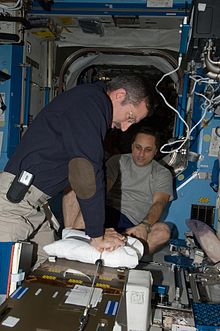
Space Medicine is a subspecialty of Emergency Medicine (Fellowship Training Pathway) which evolved from the Aerospace Medicine specialty. Space Medicine is dedicated to the prevention and treatment of medical conditions that would limit success in space operations. Space medicine focuses specifically on prevention, acute care, emergency medicine, wilderness medicine, hyper/hypobaric medicine in order to provide medical care of astronauts and spaceflight participants. The spaceflight environment poses many unique stressors to the human body, including G forces, microgravity, unusual atmospheres such as low pressure or high carbon dioxide, and space radiation. Space medicine applies space physiology, preventive medicine, primary care, emergency medicine, acute care medicine, austere medicine, public health, and toxicology to prevent and treat medical problems in space. This expertise is additionally used to inform vehicle systems design to minimize the risk to human health and performance while meeting mission objectives.
Astronautical hygiene is the application of science and technology to the prevention or control of exposure to the hazards that may cause astronaut ill health. Both these sciences work together to ensure that astronauts work in a safe environment. Medical consequences such as possible visual impairment and bone loss have been associated with human spaceflight.[2][3]
In October 2015, the NASA Office of Inspector General issued a health hazards report related to space exploration, including a human mission to Mars.[4][5]
- ^ "International Space Station Medical Monitoring (ISS Medical Monitoring)". 3 December 2013. Retrieved January 13, 2014.
- ^ Chang, Kenneth (January 27, 2014). "Beings Not Made for Space". New York Times. Retrieved January 27, 2014.
- ^ Mann, Adam (July 23, 2012). "Blindness, Bone Loss, and Space Farts: Astronaut Medical Oddities". Wired. Retrieved July 23, 2012.
- ^ Dunn, Marcia (October 29, 2015). "Report: NASA needs better handle on health hazards for Mars". AP News. Retrieved October 30, 2015.
- ^ Staff (October 29, 2015). "NASA's Efforts to Manage Health and Human Performance Risks for Space Exploration (IG-16-003)" (PDF). NASA. Retrieved October 29, 2015.